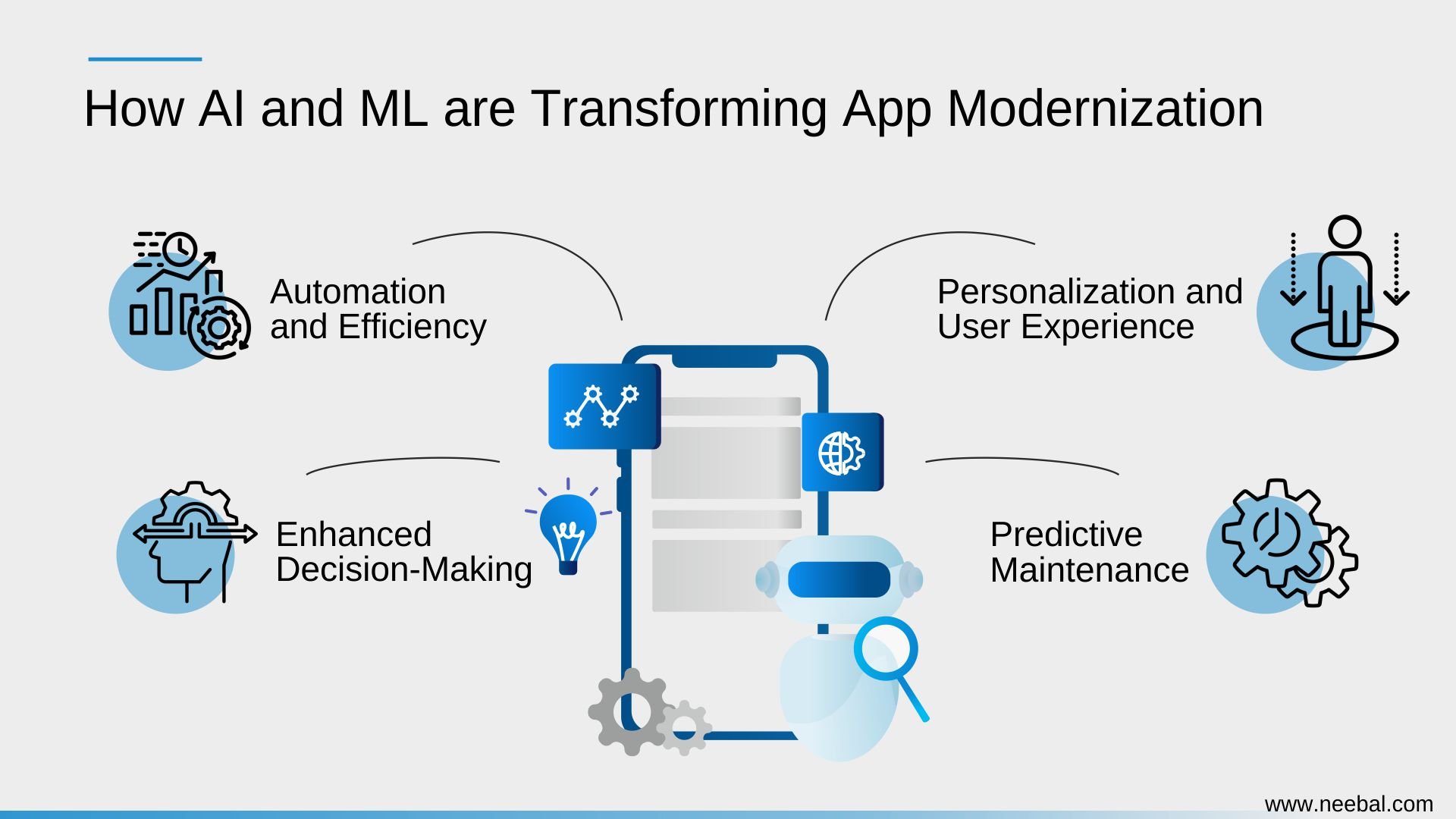In an era of rapid technological advancement, the modernization of applications has become imperative for businesses looking to stay competitive and agile in the ever-evolving digital landscape. This article delves into the pivotal role that Artificial Intelligence (AI) and Machine Learning (ML) play in the process of app modernization. We will explore what app modernization entails, the transformative potential of AI and ML, their benefits and challenges, best practices, real-world case studies, and future trends.
Understanding App Modernization
What is App Modernization?
App modernization is the process of updating and upgrading legacy applications to align them with contemporary technology standards and business needs. It involves making existing software more efficient, scalable, secure, and user-friendly. This transformation is essential, as legacy applications often hinder an organization's ability to adapt to market changes and leverage emerging technologies effectively.
Legacy Applications vs. Modern Applications
Legacy applications are typically outdated in terms of technology, design, and architecture. They may rely on obsolete programming languages, lack support, and pose security risks. Modern applications, on the other hand, are built using cutting-edge technologies, are cloud-native, and are designed for scalability, flexibility, and ease of maintenance.
Drivers for App Modernization
Several factors drive the need for app modernization, including:
- Digital Transformation: Organizations are embracing digital transformation to enhance customer experiences, streamline operations, and gain a competitive edge.
- Technological Obsolescence: Legacy applications often struggle to keep up with modern technology trends, leading to inefficiencies and increased maintenance costs.
- Security Concerns: Outdated software is more vulnerable to cyber threats, making security a top priority.
- Scalability: Modern applications can easily scale to accommodate growing user demands and data volumes.
The Intersection of AI and ML with App Modernization
Definition of AI and ML
Before delving into their role in app modernization, let's define AI and ML:
- Artificial Intelligence (AI) refers to the simulation of human intelligence in machines. It encompasses various technologies, including natural language processing (NLP), computer vision, and robotics.
- Machine Learning (ML) is a subset of AI that focuses on creating algorithms that allow computers to learn from data and improve their performance over time.
How AI and ML are Transforming App Modernization

AI and ML are revolutionizing app modernization by providing automation, enhanced decision-making capabilities, personalized user experiences, and predictive maintenance.
- Automation and Efficiency: AI and ML algorithms can automate repetitive tasks, such as code refactoring, leading to faster development cycles and reduced human error.
- Enhanced Decision-Making: ML-powered analytics enable data-driven decision-making, helping organizations prioritize which legacy apps to modernize first and where to allocate resources effectively.
- Personalization and User Experience: AI-driven personalization tailors app experiences to individual users, increasing engagement and satisfaction.
- Predictive Maintenance: ML models can predict when application components are likely to fail, enabling proactive maintenance and minimizing downtime.
Use Cases and Examples
- Automated Code Refactoring: AI can analyze and refactor legacy code to align with modern best practices, reducing technical debt and improving maintainability.
- Predictive Analytics for Application Performance: ML algorithms can predict potential performance bottlenecks, allowing organizations to optimize app performance proactively.
- Natural Language Processing in User Interfaces: NLP enables chatbots and virtual assistants to provide intuitive and human-like interactions, enhancing the user experience.
- AIOps for IT Operations Modernization: AI-powered operations can detect anomalies, automate incident resolution, and optimize IT infrastructure for improved reliability and cost-effectiveness.
Benefits of Integrating AI and ML in App Modernization
The integration of AI and ML in app modernization offers a myriad of benefits for organizations:
Improved Speed and Agility
AI-driven automation accelerates the app modernization process, reducing time-to-market for new features and updates. This agility enables businesses to respond quickly to changing customer demands and market dynamics.
Enhanced Security
ML-powered security tools can identify and mitigate threats more effectively than traditional approaches. Real-time threat detection and rapid response minimize the risk of data breaches and system vulnerabilities.
Cost Reduction
By automating labor-intensive tasks and optimizing resource allocation, AI and ML can significantly reduce operational costs in app modernization projects. Moreover, predictive maintenance prevents costly downtime.
Scalability and Flexibility
Modernized applications, built with AI and ML capabilities, are inherently more scalable and adaptable. They can seamlessly handle increased user loads and accommodate evolving business requirements.
Competitive Advantage
Organizations that harness AI and ML in app modernization gain a competitive edge by delivering superior user experiences, leveraging data for strategic insights, and maintaining robust security measures.
Challenges and Considerations
While AI and ML offer substantial benefits, there are also challenges and considerations that organizations must address:
Data Privacy and Security
As AI and ML systems rely heavily on data, ensuring data privacy and security is paramount. Organizations must implement robust data governance frameworks and adhere to regulatory requirements like GDPR and CCPA.
Skill Gap and Talent Acquisition
The demand for AI and ML expertise is high, but the talent pool is limited. Organizations may struggle to find and retain skilled professionals in these domains, necessitating investment in training and development.
Ethical and Bias Concerns
AI and ML systems can inadvertently perpetuate bias if not designed and trained carefully. Organizations must be vigilant in mitigating bias and ensuring ethical AI practices.
Integration Complexity
Integrating AI and ML into existing app modernization processes can be complex and resource-intensive. Compatibility issues and system dependencies may pose challenges.
ROI Assessment
Measuring the return on investment (ROI) for AI and ML initiatives in app modernization can be challenging, as some benefits may be long-term or difficult to quantify. Organizations should establish clear metrics and evaluation criteria.
Best Practices for Leveraging AI and ML in App Modernization
To harness the full potential of AI and ML in app modernization, organizations should follow the best practices:
Establish Clear Objectives
Define specific goals and objectives for AI and ML integration, aligning them with the organization's overall business strategy.
Selecting the Right AI and ML Tools
Choose AI and ML tools and platforms that align with the organization's needs, considering factors like scalability, ease of integration, and data compatibility.
Data Quality and Governance
Invest in data quality initiatives to ensure accurate, reliable, and clean data for AI and ML models. Implement robust data governance practices to protect sensitive information.
Continuous Monitoring and Optimization
Regularly monitor AI and ML systems for performance, security, and bias. Continuously optimize models and algorithms to adapt to changing circumstances.
Compliance and Ethical Frameworks
Adhere to ethical AI principles and comply with data protection regulations. Establish clear guidelines for responsible AI development and usage.
Case Studies
Let's examine two case studies that highlight the success of AI and ML in app modernization:
Case Study 1: Company X's Successful Integration of AI
Company X, a leading e-commerce platform, integrated AI-based recommendation systems into its legacy app. This resulted in a 20% increase in sales, as users received personalized product recommendations.
Case Study 2: Benefits Realized by Company Y
Company Y, a financial institution, employed ML-driven analytics to assess its loan application process. ML models reduced processing times by 40% and improved risk assessment accuracy by 25%.
Future Trends and Outlook
The future of AI and ML in app modernization looks promising:
The Evolving Landscape of AI and ML
AI and ML technologies are advancing rapidly, with innovations like quantum computing on the horizon. These developments will enable even more sophisticated applications and automation in app modernization.
Potential Impact of Quantum Computing
Quantum computing has the potential to revolutionize app modernization by solving complex problems at unprecedented speeds. It could drastically reduce the time required for code optimization and testing.
Industry-Specific Adoption Trends
Different industries will continue to adopt AI and ML in app modernization at varying rates. Healthcare, finance, and manufacturing, for example, will see accelerated adoption due to specific use cases.
Conclusion
In conclusion, AI and ML are pivotal in the modernization of applications, enabling organizations to achieve improved efficiency, enhanced security, reduced costs, scalability, and a competitive advantage. While challenges such as data privacy, skills gaps, and ethical concerns exist, following best practices and staying informed about emerging trends will help organizations navigate these challenges successfully. As technology continues to evolve, AI and ML will play an increasingly vital role in reshaping the future of app modernization, making it more agile, intelligent, and responsive to ever-changing business needs. Embracing these technologies is not just a choice; it's a necessity in the digital age.

